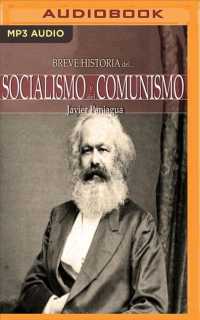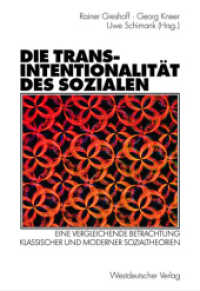- ホーム
- > 洋書
- > 英文書
- > Nature / Ecology
Full Description
This book explores the role of religion in discussions about climate change and, particularly, the development of responses to climate change on global, state, institutional, and local levels. It considers examples of the ways that different religious traditions, including Indigenous, Muslim, Buddhist, and Christian communities, have responded to the different effects of climate change by using different methodological approaches, including political science and international relations (e.g. public opinion polls and constructivism); religious studies scholarship on climate change, including an overview of religion and ecology as a subdiscipline in religious studies; and environmental humanities approaches.
This volume interrogates the diverse ways religion both acts and is acted upon by different actors, including institutions and nation states, in response to climate change. Within single traditions, different actors advocate for planetary care and concern, while their co-religionists may remain passive or deny climate change as a phenomenon.
This book unravels the complexities of how different religions approach climate change and recommends that religions are taken seriously in the development of climate change mitigation strategies at different scales.
The Open Access version of this book, available at http://www.taylorfrancis.com, has been made available under a Creative Commons Attribution-Non Commercial-No Derivatives (CC BY-NC-ND) 4.0 license
Contents
1. Summary of Implications for Academics, Policymakers, and Practitioners across and between Religious and Secular Contexts 2. Why Religion Matters for Responding to Climate Change: An Introduction 3. Relating to the Rising Waters and Warming Land: Indigenous Religions and Climate Change 4. Doctrine, Praxis, and Public Opinion: Islam's Call for Environmental Stewardship and the Varied Ways It Is Answered (and Ignored) 5. Compassion and Interdependence in the Age of Changing Climates: Buddhist Understandings of Human-Environmental Relationships in the Anthropocene 6. Concerned About Climate: The Catholic Church, Environmental Stewardship, and the Challenge to Brazil's Bolsonaro 7. Now What? Implications for Academics, Policymakers, and Practitioners Across and Between Religious and Secular Contexts








